BIG STORY
Food Crisis May Linger As Flood Hits Kaduna, Kano, Sokoto, 7 Other Northern States
Published
3 months agoon
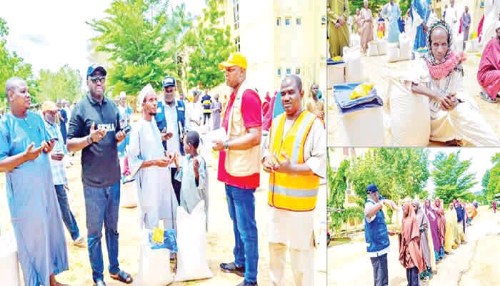
Agricultural experts and industry leaders are warning of a potential food crisis in Nigeria due to severe flooding in the northern region, which has devastated farmlands and impacted agricultural production.
They emphasize that prompt and drastic action is necessary to mitigate the crisis, as continued flooding threatens to further damage crops in the affected areas.
The ten states most severely affected by the heavy rainfall and subsequent flooding are Kaduna, Kano, Jigawa, Nasarawa, Taraba, Bauchi, Zamfara, Yobe, Sokoto, and Kebbi, highlighting the urgent need for intervention to prevent a worsening food crisis.
In an interview (with The Punch), an agricultural investor in Toro LGA of Bauchi State, Bello Yakazsi, urged the government to declare an emergency in the food sector across the country.
Yakazsi, said, “While the situation we are currently experiencing in the North can be said to be a peculiar one, it is high time that the Federal Government declared a state of emergency in the country’s agricultural sector.
“We have limited powers over the strange and dynamic play of Mother Nature but the little efforts we can muster to save ourselves from hunger and starvation must be put in place by all the government agencies. This is not the time for politics.”
It was gathered that continuous rainfall across the region posed a threat to grains and farmlands, which could lead to a poor harvest and hunger as farmers battle the scourge of drought.
As a result of the effect of the twin threat of flood and drought, some farmers in Kano State, especially those within the 14 LGAs that are at a high risk of flooding as predicted by the National Emergency Management Agency, have continued to express fears about possible flooding in the state and have begun praying against flooding as rainfall persists across the 44 Local Government Areas.
One of the farmers in Rimin Gado, Mallam Musa Sani, told The PUNCH, “Since the beginning of August, we’ve been experiencing heavy rainfall, which lasts for long hours, on a daily basis.
“As you know, too much rainfall does not allow crops to grow speedily. So, we fear that once flood occurs, farmers are at the risk of losing their crops.”
An official of the State Emergency Management Agency, who spoke on condition of anonymity because he was not authorised to speak on the matter, confirmed on Saturday that “even though the agency has yet to receive the comprehensive report on the flood from our assessment team, we are very worried about the situation but, we cannot act without any official report.”
Meanwhile, the Secretary of the Jigawa State Emergency Management Agency, Dr. Haruna Mairiga, told our correspondent in Dutse that over 2,744 hectares of farmlands had been washed away by flood in Jigawa State. The floods ravaged 12 LGAs, namely Buji, Kafin Hausa, Auyo, Hadejia, Birniwa, Malam Madori, Garki, Taura, Gwaram, Dutse, Kiyawa and Jahun.
“No fewer than 2,744 hectares of farmlands have been washed away by the flood across the 12 affected LGAs. From August 1 to 13, 2024, the state witnessed intermittent downpours leading to several incidences of flood and the death of 21 persons as well as the destruction of farmlands and houses,” Mairiga said.
He added that farmers in the state had lost over N1bn of farm produce and crops to flood.
Mansur Musa, Chairman of Kiyawa LGA, one of the worst-hit LGAs, said many farmlands and villages, as well as the LGA secretariat, have been submerged by water.
In Zamfara State, Shehu Shinkafi, a farmer on the outskirts of Shinkafi LGA said that many farmers were expecting a bumper harvest following the stability of water in their farms.
However, he expressed fears following the emergence of heavy rains in the state in recent times.
Report has it that SEMA stated that the downpour, which started last Friday and destroyed many farmlands, towns, and villages, lasted for more than 12 hours in all parts of the state. According to a report by NEMA, more heavy rainfall is expected in the state.
The agency had predicted that eight LGAs in the state - Bungudu, Gummi, Gusau, Bakura, Maradun, Talata-Mafara, Shinkafi, and Zurmi – would be affected by flooding during this year’s rainy season.
This was disclosed by the agency’s Director-General, Zubaida Umar, in Gusau during the sensitisation programme for the 2024 downscaling of flood early warning strategies for early actions.
Also, the Nigerian Hydrological Services Agency predicted that in this year’s annual flooding outlook, 31 states with 148 LGAs would be within the high flood-risk areas, while 35 states, including the FCT and 249 LGAs, were considered within the moderate flood-risk areas. The remaining 377 LGAs were forecasted for the low flood-risk areas.
Last Friday’s downpour destroyed thousands of hectares of farmlands in Zamfara, while properties worth billions of naira were lost.
On August 16, a devastating flood killed 11 people and over 500 houses affected in Gummi town, the headquarters of Gummi LGA of the state.
Ahmed Bala Gusau, who confirmed the incident, said the agency had visited the affected communities.
“It’s really sad and unfortunate as we have on several occasions enlightened the people of the state of the measures they were supposed to take to avoid flooding,” Gusau said.
Gusau pointed out that, some of the reasons for the flooding included dumping refuse on waterways, building on waterways, heavy rainfall and lack of drainages.
Other factors according to him were, poor building structures, poor attitude to refuse disposal, drainage and environmental laws.
One of the affected victims, Sanusi Garba, said, “We are seriously in need of urgent assistance because we are now homeless, we need food and other necessary daily needs. We call on the state government to as a matter of urgency to come to our aid.”
Meanwhile, a large-scale farmer in the state, Alhaji Garba Musa, advised farmers to ensure they did not block the major water routes within their farmlands to avoid flooding and destruction of their crops.
“As we still await more rainfall, I am appealing to farmers in the state to avoid blocking waterways within their farmlands so that the water can flow easily whenever it rains. I also urge those whose crops are ready for harvest to quickly do so to avoid losing them to flooding.”
Investigation (by The Punch) revealed that Yobe State was also grappling with a severe flooding crisis that has left numerous towns and villages submerged, posing a significant threat to the livelihoods of farmers in the state.
Prayer sessions have been organised as residents seek spiritual solutions to the torrential rainfall across the LGAs and Emirates in the state.
Jakusko Local Government Area has been particularly hard hit, with several towns and villages bearing the brunt of the destructive floods.
Rice farms in the riverine areas of the LGA have been completely submerged due to the relentless downpours affecting communities in Matakudkum, Dumbari, Guzumbana, Gwayo, Tasga and Jagondamasa.
Farmers in the region said they were in a dire situation, with many expressing fears of losing their entire season’s harvest.
Musa Dikko, a rice farmer, emphasised the urgent need for “on-the-ground assessments to determine the scale of the devastation and facilitate appropriate relief efforts.”
In light of the escalating crisis, organisations such as the United Nations Development Programme, Food and Agriculture Organisation, NEMA, SEMA and the North-East Development Commission have been implored to intervene swiftly and provide the necessary assistance to rescue the farming communities and the affected populations in the region.
“Collaborative efforts are essential to avert further devastation and alleviate the sufferings of those impacted by the floods in Yobe State,” said Muktahr Ahmed, a group coordinator with the state SEMA, said.
Flooding has also affected parts of Nasarawa State, destroying crops and farmlands in the North-Central state.
Although there was no heavy rainfall around most communities between August 2 and 12, torrential rains suddenly resurfaced across the 13 LGAs of the state, including Lafia, the state capital, and washed away several farmlands.
The floods ravaged a five-hectare farmland belonging to a former Commissioner of Youth and Sports Development in the state, Amb. Lucky Yargwa, destroyed crops worth millions of naira in his farmland located at the Farin Ruwa Development Area in Wamba LGA.
“About five hectares of my farm was destroyed by the floods. What is remaining now is not up to 20 percent of what I planted. I will not complain too much because I believe that God knows all things. Though millions of naira have gone, I see it as part of the challenges in the world,” Yargwa said.
Speaking on the development, the state Chairman of All Farmers Association of Nigeria, Isaac Kigbu, said, “The situation calls for concern. I want to call on the government to help us, so, that we can embark on dry-season farming. We (farmers) will appreciate all the assistance that we can get at this moment from the government and other good citizens of the country.”
It was gathered that there has been consistent rainfall in the past few weeks and almost daily in Bauchi, Sokoto and Kebbi States.
However, the worst hit farmlands, it was learnt, were in three LGAs in Sokoto, as farmers in these areas complained that they had been experiencing floods in recent times due to the excessive rainfall.
According to a statement made available to our correspondent by the spokesman of the state SEMA, Abdullahi Ghani, farmlands in Tangaza, Gudu and Gada LGAs are mostly affected.
“In Tangaza Local Government Area, over 73 farmlands were submerged as a result of heavy downpour, which resulted in flooding.
“The affected communities are Sakkwai, Ruwa-wuri, Takkau with affected areas as Tashar Atto and Unguwar -kara area.
“Also in Gudu Local Government Area, over 80 farmlands were also affected as a result of heavy downpours and floods, which resulted in the breakdown of the Earth Dam from Kutufare village.
“The affected communities are Balle, Kurdula, Kutufare, Tungar-Balle, and Ayama with about 3,300 households affected in the process.”
Abdullahi Bello, a farmer from Gudu LGA, said, “The flood has washed away my farms completely. All my hope is gone. Help us appeal to the government and authority concerned to come to our aid on how to come out of this disaster.”
In Kaduna, despite the state government’s efforts to mitigate the effects of the floods, several rice farmers lamented the losses suffered from the heavy rains.
However, Muhammad Umar, Chairman, Rice Farmers Association of Nigeria in Kaduna State, expressed optimism, saying the current rainfall across the state has brought hope for some crops to recover for a bumper harvest.
“All that is needed is for the state government to assist farmers with the necessary farm inputs like fertiliser. Certainly, the yield will be low. Thank God, it has been raining. If the rain continues, I believe some crops can pick up,” he said.
Umar also advocated for the revival of the Anchor Borrowers’ Programme, which he believes will guarantee food security and correct past mistakes.
“I think security should be improved, and the government should review the Anchor Borrowers Programme of the last administration on rice production. I think that will help the government and the citizens.”
As Umar noted, the government had disbursed trillions of naira on intervention funds to support the agricultural sector over the years.
One such was the Anchor Borrowers Programme of the Central Bank of Nigeria, which was established in November 2015 to create economic linkages between Small Holder Farmers and Anchors, but has been discontinued with the apex bank currently trying to recover funds.
Overall, the programme benefitted about 4.67 million farmers in either maize, rice or wheat farming.
Also, about N1.12trn was disbursed to 563 anchors with about N670.4bn repaid and an outstanding payment of N450.90bn.
However, the top 10 beneficiaries of the programme by amount disbursed are: Cotton Producers and Merchants Association of Nigeria, who got N15.56bn through the NISRAL MFB. It has successfully repaid N11.21bn of the principal loan and has an outstanding balance of N4.24bn.
The Kebbi State Government received N17.78bn, Maize Growers Processing Marketer Association of Nigeria got N20.07bn, which it disbursed to 105,031 farmers; North-East Commodity Association distributed N29.36bn to 107,205 farmers, who cultivated about 202,175 hectares of land, while the Wheat Farmers Association of Nigeria disbursed N30.31bn received from the CBN to 100,240 farmers, who cultivated 100,240 hectares of land.
Other beneficiaries include The National Cotton Association of Nigeria with N57.87bn and Thrive Agric, a technological company, got N92.07bn.
The third highest beneficiary of the CBN Anchor Borrowers Programme was Maize Association of Nigeria which received N92.43bn, AFEX Commodities received N169.27bn while the Rice Farmers Association of Nigeria received the most funds under the programme at N283.01bn.
Kaduna State Commissioner of Agriculture, Murtala Mohammed Dabo, who spoke with one of our correspondents in Kaduna, the state capital, emphasised the need to support farmers affected by the flood.
“Our priority now is to ensure that fertilisers reach farmers in the various villages,” Dabo said.
“We are working tirelessly to ensure timely delivery and accessibility, so farmers can recover from the flood and enhance their agricultural productivity.”
In Taraba, torrential rains returned after an initial delay. It was gathered that following fears of initial drought after a prolonged delay in rainfall in Jalingo, the state capital, and environs, the state on Friday witnessed a downpour.
Report from Jalingo has it that for over three weeks there were no rains in the state, which forced Muslims and Christians alike to resort to prayers for rainfall.
In response to the prayers, the Taraba sky opened up late Thursday night till late Friday, sending a signal that there might be severe flooding in some parts of the state if the rain continued.
In Benue State, it was lamentation galore. The farmers, who claimed to have suffered serious financial setbacks as a result of insufficient rain during the 2024 rainy season, lamented that late rainfall, which commenced only around May and lasted for about two months, has since stopped.
The Nigerian Meteorological Agency had in February 2024 predicted a delay in rainfall in some states, including Benue. Also, in early July, the agency predicted rainstorms in Benue, and other states.
Investigations (not by PorscheClassy News) revealed that in July, some parts of the state, particularly the riverine areas like Makurdi, Agatu and Guma LGAs experienced flooding.
But hardly had the flood subsided that the state began to experience a shortfall of rain, which commenced around the third week of July and overlapped with the August break.
Being an agrarian state, farmers in their various categories (peasant and commercialised) have as a result been crying over the recent development in the state.
A mechanised farmer in the state, Vitalis Tarnongo, decried the sudden absence of rain when it was needed most.
He said, “This is a serious situation. We are just managing the situation. The drought has seriously affected our crops because they are drying up. Even the pesticides are not working.
“Some of the grains, like rice and corn that we cultivated, have no moisture in the soil to make the crops grow.”
There were also calls to fast and pray over the absence of rainfall in Adamawa State, just as the farmers begged the Federal Government to help cushion their plights with palliatives.
Report has it that Christians and Muslims in Adamawa last week declared a week prayer sessions over the impending.
The Chief Imam of Sengere Friday mosque, Mallam Garba Ali, told our correspondent that the prayers organised by Muslims in Girie LGA were to appeal to God to release rainfall for the good of the farmers.
“We experienced drought in Adamawa State in 1991, and ever since we have not experienced it again. In fact, this year’s drought is the worst in the history of the state,” he said.
Also, Christians in Sengere, comprising all churches, equally declared a week of fasting and prayer sessions over the draught in the state.
The leader of the Christian prayer group, Pastor Amos Peter, of the World Chapel Church said, “Fasting and prayer is mandatory for all Christians. It is not new to us, so what we did is in line with what the Bible says.”
Some of the farmers that spoke to our correspondent in Yola, lamented that their crops, especially maize, dried up due to lack of rains.
Isa Sale, according to The Punch, said that his three hectares maize farm located in Girie Local Government was destroyed.
“I don’t know how I will pay the loan I collected for the farm, the whole farm is gone. It is as good as my life is also gone, only God can rescue me,” he cried out.
The chairman of maize farmers in the state, Dr. Lazarus Rufus, advised maize farmers to plant 60-day beans on their maize farms that were destroyed by the drought.
He faulted the government for not providing information on the drought in good time, which he said would have helped the farmers avoid planting early.
The NiMET 2024 rain patterns forecast released recently stated that there will be Little Dry Season from July 22 to August 18 in Adamawa, Taraba, and other northern states. However, the information came late as farmers planted crops before it was released.
“The Federal Government should be up and doing in providing information on rainy season so that farmers can know when to plant and what to plant,” he said.
When our correspondent visited some of the farms, he witnessed that several maize farms had dried up, despite the return of rainfall.
Few weeks after the Borno State Deputy Governor, Umar Usman Kadafur paid a sympathy visit to Bui LGA, over the flood disaster that rendered many residents homeless, farmers in the state have raised the alarm of another potential flooding, which they fear could affect their crops, property and farmlands.
The farmers, who voiced their concern in an interview with our correspondent in Maiduguri, said they were worried by news of flooding from neighbouring Yobe State.
Borno State Coordinator, Federal Ministry of Agriculture, Dr Abdulkareem Damagun, said the ministry had been on the alert against potential floods following a report by the Nigeria Metrological agency in July that heavy rainfall would disrupt agricultural processes and destroy crops on farmlands in the state.
“Immediately the assessment made by NIMET was given to me, I sensitised the farmers. We made them (those in flood-prone areas) understand that they should prioritise crops that flooded tolerant like rice and wheat.”
However, as a way of mitigating potential flooding effects this year, the North East Development Commission said it was working to ensure that farmlands were not deserted by excess rainfall within Borno State and its environs.
The Managing Director of the commission, Goni Alkali, said the NEDC had initiated the evacuation of one million metres of drainage systems in Borno, Yobe, Adamawa, Taraba and Bauchi states to mitigate flooding in both rural areas and urban Cities
“In Maiduguri, we are currently desilting 250,000 metres of drainages. We are going to do similar interventions in other states,” Alkali said
Meanwhile, Nigeria’s agricultural sector recorded a decline in the first quarter of 2024, according to figures presented in the Gross Domestic Product by the National Bureau of Statistics despite trillions spent on intervention funds over the years.
According to the NBS, the agricultural sector contributed 21.07 percent to GDP in Q1.
In real terms, the sector comprising of crop production, forestry, livestock, fishing contributed a sum of N10.14tn.
The performance of the agricultural sector in the first quarter of the year reflects the current situation with food security across the country.
This figure is lower than the rate recorded in the corresponding quarter of 2023 and the immediate past quarter.
In Q1, 2023, agriculture’s contribution to GDP stood at 21.66 per cent, this rose to 26.11 per cent in the last three months of the year.
In real terms, the sector recorded N10.06tn in Q1, N10.98tn in Q2, N15.99tn in Q3 and N16.25tn in the fourth quarter of 2023.
However, in the first quarter, the sector recorded a decline of 5.04 per cent in its contribution to GDP.
Further analysis showed that Nigerian farmers contributed N8.92tn in the first quarter of 2024 from N8.73tn in the preceding quarter of 2023.
The decline in the contribution of agriculture to GDP compounds the food inflation woes currently bedevilling the country.
Credit: The Punch
You may like
-


JAPA: UK Net Migration Falls By 20% Amid Visa Restrictions
-
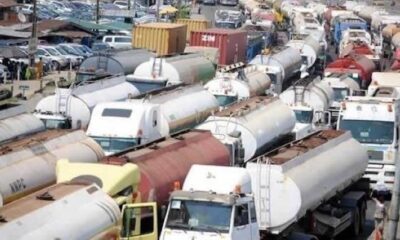

Port Harcourt Refinery: Marketers Threaten Boycott As NNPCL Juggles Petrol Price
-
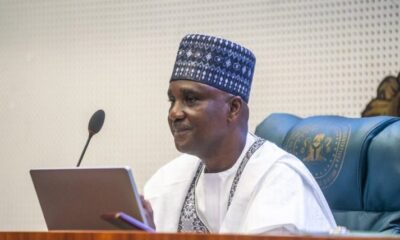

Reps To Probe N8.4tn Allegedly Withheld By NNPCL
-


30-Year Experience Prepared Me For COAS Job — Olufemi Oluyede
-


President Tinubu To Name New Ambassadors After France, South-Africa Visits
-


Finnish Court Sets May 2025 Deadline For Ekpa’s Trial Amid Alleged Terrorism Case
BIG STORY
JAPA: UK Net Migration Falls By 20% Amid Visa Restrictions
Published
14 hours agoon
November 28, 2024
Net migration to the United Kingdom has dropped significantly, with figures for the year ending June 2024 standing at 728,000, a 20 per cent decline from 906,000 the previous year, according to the Office for National Statistics, on Thursday.
The reduction is largely attributed to changes in visa policies implemented by the UK government earlier in the year.
“Our latest estimates indicate a fall in long-term net migration (the difference between people coming to live in the UK and those leaving to live elsewhere).”
“Our provisional estimates show a 20% reduction between our updated estimate for year ending June 2023 (906,000) and our latest estimate for YE June 2024 (728,000).”
“This fall is driven by a decline in long-term immigration mainly because of declining numbers of dependants arriving on study visas,” the report said.
Restrictions introduced in January 2024 prevented many international students from bringing dependants, resulting in a decrease of 94,000 in study visa applications compared to the previous year.
Similar rules introduced in March also prohibited care workers from bringing family members.
While applications for skilled worker visas increased slightly early in the year, there has been a decline since April 2024, when the government revised the list of eligible jobs for the visa category.
The ONS reported that of the 1.2 million people who migrated to the UK during this period, 86 per cent were non-EU nationals, 10 per cent EU nationals, and 5 per cent British nationals.
Indian nationals formed the largest group of non-EU migrants for both work and study purposes, with 116,000 arriving for work and 127,000 for education.
Dependants accompanying work visa holders totalled 233,000, up from 166,000 the previous year, although recent data indicates this number may now be falling.
Emigration also rose, with 479,000 people leaving the UK by June 2024, compared to 414,000 the previous year. EU nationals made up 44 per cent of those leaving, while 39 per cent were non-EU nationals, and 16 per cent were British citizens.
BIG STORY
Port Harcourt Refinery: Marketers Threaten Boycott As NNPCL Juggles Petrol Price
Published
18 hours agoon
November 28, 2024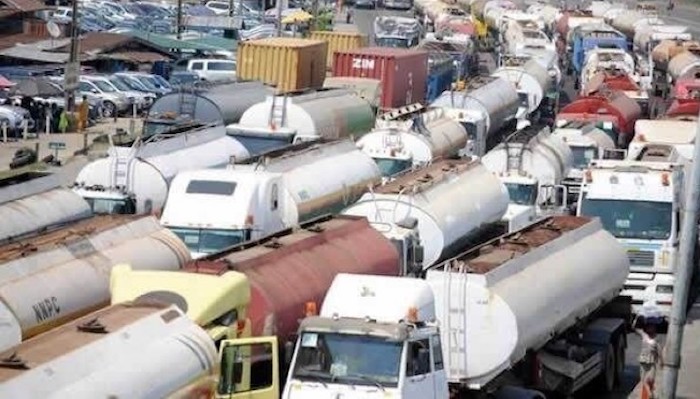
- Dealers Insist PMS Must Be Cheaper Than Dangote’s.
- NNPCL Delays Price Portal Opening, Restricts Product.
Oil marketers have outlined the conditions under which they would consider patronizing the newly rehabilitated Port Harcourt Refinery Company (PHRC) in Rivers State. They stated that the refinery, managed by the Nigerian National Petroleum Company Limited (NNPCL), must offer its refined petroleum products at prices lower than those set by the Dangote Petroleum Refinery.
In response to claims made on Wednesday that its petrol was being sold at approximately N1,045 per litre, the NNPCL clarified that the refinery had not yet released its prices. According to the company, products from the refinery are currently being supplied only to NNPCL-owned stations.
Olufemi Soneye, the spokesperson for NNPCL, explained that the company is still reviewing its pricing structure and has not yet begun bulk sales, as its purchasing portal remains closed.
In related news, it was reported on Wednesday that oil marketers had imported a total of 105.67 million litres of petrol into the country within a span of five days.
Marketers confirmed that NNPC was selling petrol at N1,045/litre, stressing that they may be compelled to opt for petrol importation as a means of meeting local demands.
According to The Punch, a total sum of 78,800 metric tonnes representing 105.67 million litres of petrol was imported into the country in the last five days spanning November 23 and November 28.
On Tuesday, the 60,000-capacity Port-Harcourt refinery resumed operations after years of inactivity, drawing initial praise from Nigerians and industry stakeholders.
The NNPC said the newly rehabilitated complex of the old Port Harcourt refinery, which had been revamped and upgraded with modern equipment, is operating at a refining capacity of 70 per cent of its installed capacity.
NNPC added that diesel and Pour Fuel Oil would be the highest output from the refinery, with a daily capacity of 1.5 million litres and 2.1 million litres, respectively.
This is followed by a daily output of Straight-Run Gasoline (Naphtha) blended into 1.4 million litres of Premium Motor Spirit (petrol), 900,000 litres of kerosene, and low-pour fuel oil of 2.1 million litres.
It was stated that about 200 trucks of petrol would be released into the Nigerian market daily.
However, claims that the national oil firm’s PMS price was higher than that of Dangote triggered diverse reactions from marketers.
The National Publicity Secretary of the Independent Petroleum Marketers Association of Nigeria, Chinedu Ukadike, told one of our correspondents that though NNPC had yet to release any price for the products from the refurbished Port Harcourt refinery, a high price would discourage marketers.
Dangote currently sells his petrol at N970/litre, while imported petrol is around that price.
Ukadike, however, noted that there was the possibility that the NNPC would review its prices downward when the Port Harcourt refinery comes fully on stream.
He confirmed that the state-owned oil company sells a litre of PMS at N1,040 or N1,045 while the Dangote refinery just reviewed its price from N990 to N970 for marketers buying a minimum of two million litres.
Ukadike did not mince words when he said independent marketers would only buy from the NNPC if its price is cheaper than that of Dangote or vice versa.
“With the Port Harcourt refinery now working, we are anticipating that any moment from now, NNPC will give us its price. Once NNPC releases its price, we will start loading from NNPC. That is subject to if it is cheaper than that of Dangote.
“The last NNPC price was N1,040 and N1,045 per litre. But I know there will be a review of prices because there has been a crash in prices globally. So, we are expecting a review. Once that review is done, I will be able to give you the actual price. I know they are reviewing it. They are on top of the matter,” the IPMAN spokesman said.
The latest development also indicates that oil marketers may commence the importation of fuel if the prices set by both domestic refineries surpass their profit margins, thereby making it more financially viable for them to rely on imported fuel rather than locally produced stock.
The National Public Relations Officer of the Petroleum Products Retail Outlets Owners Association of Nigeria, Dr Joseph Obele, had earlier said NNPC petrol was N75 higher than the N970/litre offered by Dangote refinery.
However, PETROAN’s President, Billy Gillis-Harry, in a statement denied the claim, stressing that no price has been released by the national oil firm.
He explained that members of the association bought PMS based on the old pricing structure and are still waiting for the updated prices.
The statement read, “The National Headquarters of Petroleum Products Retail Outlet Owners Association of Nigeria, PETROAN Abuja would Like to Inform the media and the general public that no new price for PMS has been released by the NNPC port Harcourt refinery.
“Members of PETROAN only bought PMS with the old pricing template awaiting
new prices. We are excited that the production and loading of refined petroleum products have commenced at the Port Harcourt Refinery and we are expectant that soon the price of PMS will be stated by NNPC to the benefit of Nigerians.”
- NNPC Reacts
But in a message sent to journalists on Wednesday night, the NNPC spokesperson said the national oil firm had not started selling its products from the Port Harcourt refinery to other oil marketers.
He was reacting to an earlier claim by the Petroleum Products Retail Outlets Owners Association of Nigeria that the newly rehabilitated Port-Harcourt refinery was selling at N1,045/litre to oil marketers.
He noted that only NNPCL retail stations are receiving products from the refinery.
He said, “We have not yet commenced bulk sales, and we have not yet opened the purchase portal as we are still finalizing the necessary processes.”
He further stated its current stock was procured from the Dangote Refinery and includes fees and levies.
“At present, the products we are selling are what we bought from the Dangote Refinery, which includes NMDPRA fees. The product from PH is currently for our retail stores. Our prices are regularly reviewed and adjusted as required.”
- PMS Imports
Meanwhile, fresh findings (by The Punch) have revealed that a total sum of 78,800 metric tonnes representing 105.67m litres of petrol have been imported into the country in the last five days spanning November 23 and November 28.
The product was conveyed in four vessels with the latest to be received today (Thursday, November 28, 2024), according to documents obtained from the Nigerian Ports Authority on Wednesday.
An analysis of the document showed that 38,500 metric tonnes of petrol imported on Monday, November 25 berthed at the Lagos Apapa port (Bulk Oil Plant).
Similarly, a Bedford ship conveying 10,000mt of PMS will berth at the Ebughu jetty, Calabar port in Cross Rivers on Thursday, November 28.
Two vessels that arrived on Saturday, November 23 is still waiting to berth. The ships are carrying 30,300mt of fuel.
It also revealed that 11,000 metric tonnes of base oil was imported while the 20bn Dangote refinery received crude oil worth 133,986 metric tonnes on Monday, November 27, 2024.
Last week, oil marketers and the NNPCL had stated plans to stop the import of fuel to focus on off-taking from domestic sources.
This was a fallout from a high-level meeting organised by the NNPC Group CEO Mele Kyari, and the Nigerian Midstream and Downstream Petroleum Regulatory Authority. In attendance were representatives of the Major Oil Marketers Association of Nigeria, Depot and Petroleum Products Marketers Association of Nigeria, and key stakeholders from companies such as 11 Plc, Matrix, and AA Rano, among other stakeholders at the NNPCL towers in Abuja.
The meeting was in growing confidence in Dangote Refinery’s ability to meet the nation’s domestic fuel demand and the need to cut fuel imports.
Credit: The Punch
BIG STORY
Reps To Probe N8.4tn Allegedly Withheld By NNPCL
Published
19 hours agoon
November 28, 2024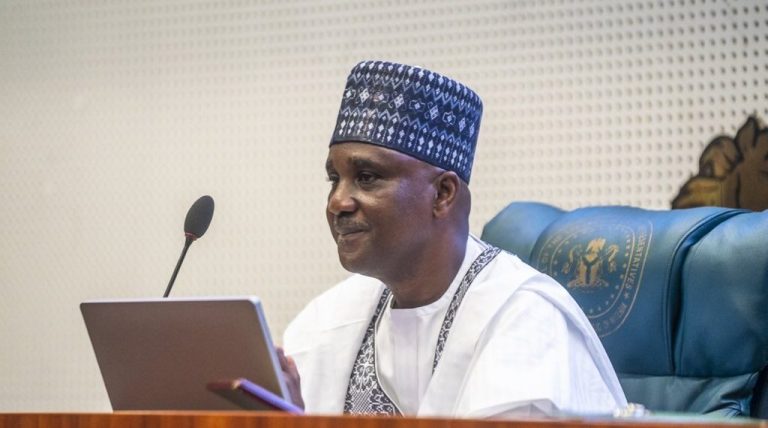
On Wednesday, the House of Representatives instructed its Committees on Finance, Petroleum (Upstream and Downstream) to investigate reports from the Revenue Mobilisation Allocation and Fiscal Responsibility Commission “alleging that the NNPC (now Nigerian National Petroleum Company Limited) withheld N8.48tn as claimed subsidies for petrol.”
The House also emphasized that “the investigation will address the NEITI report stating that NNPC (now NNPCL) failed to remit $2bn (N3.6tn) in taxes to the Federal Government.”
The committees were tasked with verifying the total cumulative amount of unremitted revenue (under-recovery) from the sale of petrol by the NNPC between 2020 and 2023.
Meanwhile, the House approved the 2025-2027 Medium-Term Expenditure Framework (MTEF) and Fiscal Strategy Paper (FSP) ahead of President Bola Tinubu’s presentation of the 2025 Appropriation Bill to the National Assembly next week.
The MTEF is a multi-year plan for public expenditure that sets targets for budget spending and fiscal policy, ensuring these goals are met throughout the budget process.
The FSP outlines a country’s fiscal policy and medium-term macro-fiscal framework. It is a critical part of the annual budget process and the Medium-Term Budget Framework.
President Tinubu had transmitted the MTEF/FSP to the National Assembly on Tuesday, November 19, 2024, following the approval of the Federal Executive Council.
The Tinubu administration set the oil benchmark for 2025 at $75 per barrel, with oil production projected at 2.06 million barrels per day. The government also pegged exchange rate parameters at N1,400 per dollar, with a projected Gross Domestic Product growth rate of 6.4% per annum.
During the Committee of Supply meeting to consider the report of the Committees on Finance and National Planning and Economic Development, presiding officer and Deputy Speaker Benjamin Kalu expected the usual “carried” chorus from members when he began the clause-by-clause consideration of the 15 recommendations. However, the Minority Leader of the House, Kingsley Chinda, changed the tone of the discussion.
- Oil Benchmark Controversy
Chinda spoke out on the $75 oil benchmark, suggesting that the 2025 figure should reflect the 2024 benchmark, pointing to the higher prices reached in early 2024.
He said, “Because of the importance and sensitivity of MTEF, I will advise that we consider it thoroughly before we pass. This is one of the most important bills this parliament will ever pass. They recommend a $75, $76.2, and $75.3 benchmark per barrel of crude for 2025, 2026, and 2027 respectively.
“We are aware that for 2024, what we recommended was $77.96, which is the current budget. Today, it is about $85 per barrel. That is, in the first quarter of 2024, we achieved $85 and it increased further. If we are recommending $75 for next year, which is one month away, against the $77 we recommended for this year, I will advise that we retain the minimum we adopted for this year.
“Rather than increasing, we are reducing. I am not unaware of the issue of moving to gas-propelled vehicles, leaving fossil fuel. I am aware that the world is moving that way, and reliance on crude may be a bit reduced, but going for $75 might be a bit too low,” he said.
In response, the Chairman of the House Committee on Finance, Abiodun Faleke, defended the $75 per barrel benchmark as “responsible.”
He stated, “Crude oil prices in the international market are not controlled by any country. In 2024, we were fortunate that crises in some oil-producing countries led to higher prices. In 2025, there is likely to be more stability. If you set the benchmark too high, it bloats expectations. Today, the price has crashed to $74. I think our benchmark is reasonable.”
Ibrahim Isiaka, the member representing Ifo/Ewekoro Federal Constituency, Ogun State, supported this view, saying, “If we pass this MTEF today and there is a need for amendment, this House can sit and do the necessary review. There was a time when crude sold for $120 per barrel and a time it sold for $20. Let us see this as a working document subject to review.”
At the conclusion of the debate, the $75 benchmark was adopted.
- Oil Production
Another contentious point was the significant increase in domestic crude oil production, projected to rise from 1.78mbdp in 2024 to 2.06mbdp, 2.10mbdp, and 2.35mbdp in 2025, 2026, and 2027, respectively.
Chinda questioned the rationale behind the 2025 projection of 2.06mbpd, saying, “We are making projections for domestic crude oil production from 1.78mbpd in 2024 to 2.06, 2.10, and 2.35mbdp for 2025, 2026, and 2027. If you look particularly at the social media, they will tell you that we are producing about 2mbpd, but the truth is, we are not. Although there is improvement, as of yesterday, the volume was 1.05mbpd.
“These are the things that will help us in proper planning so that the government does not have to always come to the National Assembly for borrowing, which also exposes us further to criticisms by Nigerians.
“We must be critical about how we set our benchmark. Our target has always been to produce 2mbpd. OPEC’s quota for us is 1.8mbpd. Putting this ambitious target of 2.06mbpd and 2.35mbpd, we might not really achieve it. If we don’t achieve it, we know we will be tightening our belts. We are already projecting that we will sell 2.06 million barrels, and if we sell less, we will get less funds. Let us reduce our target rate to 2 million barrels per day, which has always been our target,” Chinda argued.
Faleke defended the recommendation, stating, “As of today, production is close to 2mbpd. It is getting better. Operators of NUPRC gave us the details. If you put a lower projection, you are indirectly telling the operators not to work hard. Let us push them to work harder and get more funding for our country. There was a time during the era of Goodluck Jonathan when we were around 2.5mbpd. Mind you, this 2.06 projection includes all the concentrates. It is not just crude oil alone.”
Regarding the proposed exchange rate of N1,400 to the dollar for the next three years, a lawmaker from Nasarawa State, Gbefwi Gaza, said, “In the past few years, we have seen the volatility in our currency. In this country, virtually everything we do is pegged to the dollar. If we don’t have a very good proposed rate, what that means is that we have to increase our borrowing for any deficit.
“What do we have on the ground to make the naira stronger and make the dollar weaker? Yes, we have the Dangote Refinery, but we are in a phase of energy transition. We are going to the era of using more batteries and fewer fossil fuels; yet, fossil remains our main source of income.”
The House also adopted inflation rate projections of 15.75%, 14.21%, and 10.04% for 2025, 2026, and 2027, respectively.
Additionally, the House agreed that “The 2025 Federal Government of Nigeria budget proposed spending of N47.9tn, of which N34.82tn was retained. New borrowings stood at N9.22tn, made up of both domestic and foreign borrowings.”
Capital expenditure is projected at N16.48tn, with statutory transfers at N4.26tn and sinking funds at N430.27bn.
Most Popular
-

 BIG STORY4 days ago
BIG STORY4 days agoDiscos May Move Three Million Subscribers To Estimated Billing Over Failure To Upgrade Prepaid Meters
-

 BIG STORY4 days ago
BIG STORY4 days agoDonors Supporting Simon Ekpa Guilty Of Terrorism — Lawyers
-

 BIG STORY4 days ago
BIG STORY4 days agoBritish Court Orders David Hundeyin To Pay N200million As Damages To BBC Journalist For Libel
-

 BIG STORY3 days ago
BIG STORY3 days agoJUST IN: Ebonyi Governor Suspends Health, Housing Commissioners Over “Gross Misconduct, Negligence Of Duty”
-

 BIG STORY2 days ago
BIG STORY2 days agoJUST IN: Customs Hands Over 21 Stolen Vehicles To Canadian Government
-

 BIG STORY3 days ago
BIG STORY3 days agoAn Aspirant Gave Each Delegate $30,000 During PDP Primary In 2022 — Dele Momodu
-

 BIG STORY3 days ago
BIG STORY3 days agoTwo US-Based Nigerians Bag 30-Year Jail For $3.5m Romance Scam
-

 BIG STORY3 days ago
BIG STORY3 days agoBREAKING: Finally, Port Harcourt Refinery Begins Production









